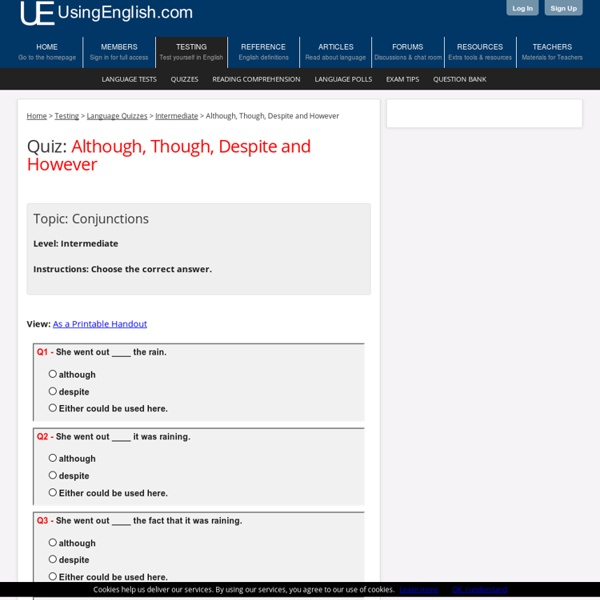



English Linguistics: Linkers and connectors Contrast . In spite of / Despite Link two contrasting ideas. . . . . . Reason and cause . . Purpose . . Consequence . . . Addition . . . For example / For instance Introduces an example referring to previously stated ideas. . . but / yet: followed by a noun phrase or a sentence. ‘The book is short but / yet interesting’ . in spite of / despite: It is placed at the beginning or in the middle of the sentence. ‘He arrived on time despite / in spite of getting up late’ although / though/ even though / in spite of the fact that: followed by a complete sentence. ‘Although / though / even though / in spite of the fact that the pupils had not studied, they all passed their exams’. . however, nevertheless, even so, on the one hand, on the other hand, on the contrary: ‘He was quite ill however/ nevertheless/ even so, he went to school’ . while, whereas ‘This film is very interesting, while/whereas that one is quite boring’ Reason and cause . because, as since, seeing that: . in order to, so as to, to: Succession
To / in order to / so as to / so that-English To, in order to, so as to, so that. These structures express purpose and answer the question why something is done. To We use 'to + verb' to say why we do something. Examples: I'm going to Ireland to visit my family. I went to the post office to buy some stamps. In order to So as to We can also use 'in order to' or 'so as to'. Examples: I'm going to Ireland in order to visit my family. I went to the post office so as to buy some stamps. Note 1- 'in order to' and 'so as to' are more common before stative verbs like: be, have, know, appear, seem, understand, etc. Example: she left work early in order to be at home with the children. 2- Before a negative infinitive, we normally use 'so as' or 'in order'. Example: I am leaving now so as not to be late. (not: I am leaving now not to be late). 3- Do not use 'for' before the infinitive of purpose. Example: I phoned Jenny to invite her to dinner. (not: I phoned Jenny for invite her to dinner). It is normally followed by modal such as can or will.
Cambridge English: Advanced CAE - Word Formation The third part of the Reading & Use of English paper in the CAE Advanced Examination is word formation where students use a root such as 'able' and create an appropriate word (disable, unable, ability) to fill the gap in a text. Word Formation Worksheet 1 - Answer Sheet Word Formation Worksheet 2 - Answer Sheet Word Formation Worksheet 3 - Answer Sheet Come and join esl-lounge Premium. High quality PDF lesson plans. Premium Home Page | Free Samples | Why Join | FAQ | Sign Up! ★ Winter Coupon Discount★$8 off Lifetime Membership. Word Formation Worksheet 4 - Answer Sheet Word Formation Worksheet 5 - Answer Sheet Word Formation Worksheet 6 - Answer Sheet Exam Tip! If a student is sure that the word is, for example, an adjective but he/she can't think what the exact word is, get them to try thinking of "usual" prefixes and suffixes. Word Formation Worksheet 7 - Answer Sheet Word Formation Worksheet 8 - Answer Sheet Word Formation Worksheet 9 - Answer Sheet Word Formation Worksheet 10 - Answer Sheet
Fiesta ESL - Vocabulary Exercises - Word Formation (1) The following exercises are especially useful for those students taking the First Certificate exam. Complete the following sentences by adapting the word given in brackets.Exercise 1 1) We need to find a __________ to the problem as soon as possible. 2) Juan speaks English fluently and makes very few __________ mistakes. 3) The teacher keeps a record of every student's __________ . 4) Air-conditioning is a ___________ if you live somewhere like the south of Spain. 5) Don't be afraid of the dog. 6) The company is trying hard to improve customer __________ . 7) Measures were taken around the world to __________ airport security after the 11 September attacks. 8) We're going to change our suppliers as they have become very __________ in the last year. 9) Patricia's very __________ . 10) We need your __________ at the bottom of the page. Exercise 2 1) The index at the back of the book is in __________ order. 2) The fans waved __________ as the film star stepped out of the limousine.